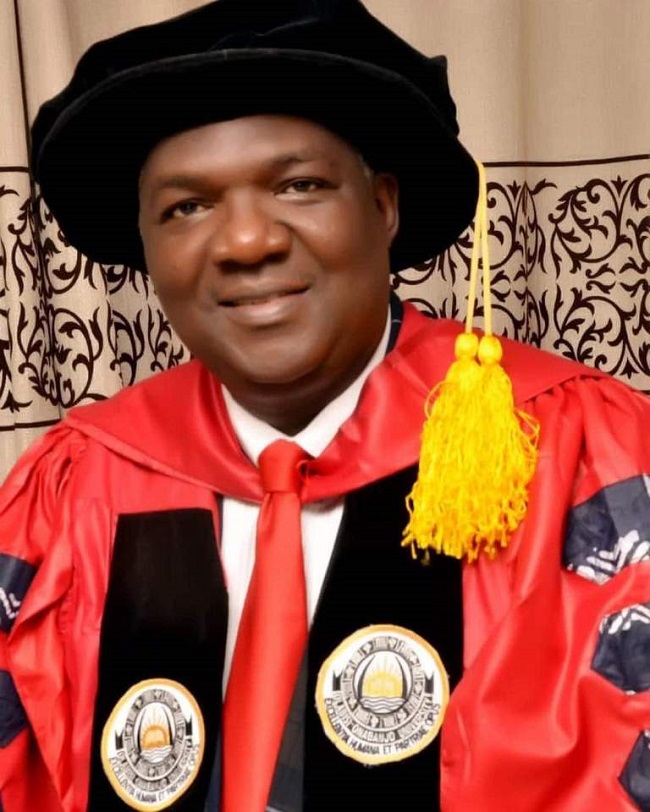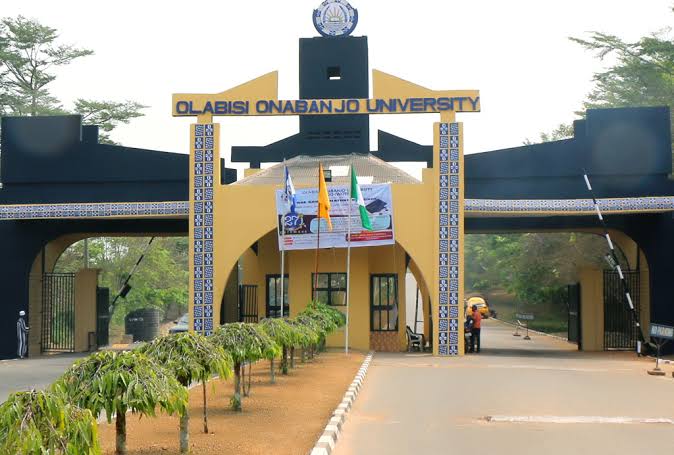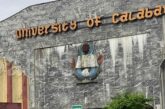The Vice-Chancellor of Olabisi Onabanjo University, Ago-Iwoye, , speaks in this interview with BANKOLE TAIWO on the challenges confronting university administration, calling for all hands to be on deck to reposition the country’s university education and avert a bleak future. Excerpts:
Looking back at your administration’s achievements over the past two and a half years, what would you consider the most significant, sir?
It has really been challenging and encouraging at the same time. The administration will be two and a half years in office by March. When we took over in October 2022, we drew up a 10-year strategic plan for the university and we have been able to start implementing some of them. In the document, we talk about the 3Es and they are Education, Employability and Entrepreneurship. We believe that to achieve these three concepts, human resources are quite germane, we must make the human resources happy to give their very best because it is often said that when you take over people’s hearts, they will release their pockets for you. I have neither allowed the success story of being appointed as the vice-chancellor to enter into my head, nor have I allowed the frustration I met on the seat to get into my heart.

The first thing we have been able to do is to normalise the calendar of the university. I got my appointment when the university was coming out of seven or eight months of national strike but in the last two years, we have been able to normalise the calendar with the support of the staff of the university. There was even a time when we finished a session on Friday and by Monday we started another session. There was another time we had a 10 days break but right now, we run October to June. This has given us enough room to have our plans implemented. We are also ensuring the welfare of our staff, we pay salaries as and when due. By the 25th of every month, the salaries are taken to the bank. As we speak, we have concluded the 2024 promotion exercise for our staff, though it is stressful as we have to meet monthly to ensure we cleared all arrears of promotions.
To further strengthen the employability of our students and make them relevant to the industry needs, we have equally strengthened our partnership with the industries around us in the area of the Students Industrial Work Experience Scheme. We have signed MoUs with Nestle and a host of others and this has helped our students to have their internship in these companies without any problem. There is even a company that has employed two expatriates, one each from the UK and South Africa, to teach our students in the area of bio-sensors. It’s a new area of focus too. Our cars use remotes, even our phones use sensors, so this company is helping in the training of these students and the last time we sat with them, they said they are ready to employ as many as 200 of our students after their youth service, that is if the students are ready to work with the company. The company called Codix Pharma Ltd is a minute’s drive after Ilisan Junction on the Sagamu-Ijebu-Ode expressway just beside the newly constructed road to the Ogun Agro-Cargo Airport. It is the first in West Africa and the second in Africa. We have also been able to expose these students such that they can work anywhere in the world. For instance, we have signed an MoU with the University of Swansea for dual degrees for our students, joint conferences and joint publications.
This partnership with Swansea University provides a unique opportunity for top-up degrees for our graduates, especially from the Faculty of Administration and Management Sciences and Economics graduates. Our curricula in various subject areas are being matched with that of Swansea University, such that graduates of such programmes will spend an additional year in Swansea and will be awarded the Degree of Swansea University.
We also have the opportunity for a two + two degree whereby our students could spend two years in OOU and then transit to Swansea University to spend two years and earn the degree at Swansea University. We have as well joint supervision of research students. In this regard, a person enrols in OOU for a PhD and is supervised by faculties in OOU and Swansea University. We are also processing PhDs by publications only, among others. The same is being done for Forensic Science at the University of Central Lancashire.
Aside from this, we have also brought down some experts to train our staff on how to access grants and this has been yielding fruits with lots of our lecturers now winning grants. One of the lecturers just won $60,000, another won $400,000 and so on.
In the area of infrastructure, we have been enjoying great support from the people. The Ogun State indigenes residing in Ghana are about building an international office for us and we have the Barr Asekun Resource Centre and Alhaji Lawal Fagbo Saheed 750-lecture theatre. There is Iya Moji Paediatric Surgery in Olabisi Onabanjo University Teaching Hospital, Sagamu, built by one of our alumni, there is another one who gave us N20m worth of solar panels and a whole lot of support and intervention from that end. Dr Kunle Hassan, the Chairman of Eye Foundation Hospital Group, is also committing about N1bn to a professorial chair endowment in Ophthalmology and a building he is planning to build for us…I do not doubt in my mind that the university is set up for greatness.
We have equally done a lot in reshaping our landscape. We have cleared some thick forests to enhance the visibility and aesthetic of the university. We have also introduced 20 new academic programmes and they are all fully accredited by the National Universities Commission. By and large, we have been on our feet trying to be the best and we are not relenting anytime soon.
Can you share some of those challenging experiences, sir?
Anywhere you have human resources, you’re bound to have challenges, because they are not robotic or machines. The first one has to do with the student crisis, not really from our students but from some others outside the institution who said they want to fight for our students, claiming that our students are being cheated or so…it was a new dimension to me, having been a student union leader in the past myself. What normally happens is for students to start agitation and then look for help outside but in this case, the students themselves are peaceful but a group from outside said they want to help them fight for their rights. Now, it became a situation where our students were sending those outsiders away. It was a challenge for about three or four days until God helped us to manage it with wisdom. The other issue has to do with the increase in the cost of transportation which my students had to bear due to the prevailing economic reality. I was already thinking of having a transportation system to solve the crisis but we were able to eventually resolve the issue. As for the staff, they have been cooperating, yes they will always agitate because they want more money and the money is not there, so we usually sit down together and schedule how to pay some of these entitlements.
To what extent has Japa syndrome affected the university and how have you been able to manage the situation?
We have had our share of Japa syndrome, which is the common language used to describe the migration of skilful workers to Europe and other parts of the world in search of greener pastures. I can say that between 20 per cent to 40 per cent of our staff were affected by Japa syndrome. However, we are using technology to solve a lot of the problems created by their exit. We now have online classes such that the students can be taught anywhere in the world, although it is stressful, we are improving our infrastructural base to increase our accommodation capacity to solve this challenge.
Just like in private universities, there is now a noticeable increase in the number of First Class graduates in public universities. This year, 115 students graduated with First Class, compared to 99 last year. What has changed? Or is the award of First Class becoming a competitive race between public and private universities?
Not at all. The award of First Class is a function of the performance of the students and the type of admission we have nowadays. I may not be able to speak for other universities, but the Senate of our university has put more stringent conditions on the admission of students and this has helped to enhance the quality of students admitted and their performance too. Can you get good products from bad material? Prof Ishaq Oloyede, the JAMB Registrar, made the admission we have been doing for the past five years better by insisting on merit. Virtually all the admissions done under my watch in the last two years had been on merit. In fact, if your JAMB score is not up to 300, you may not be able to study medicine in OOU. Yes, the population of students applying to study is increasing, for instance, we had over 37,000 for the last admission but I have a quota of 8,250 to be offered admission. You can imagine the type of students that I will admit, of course, it will be the best of them all. Additionally, we are also recording our lectures now such that the students have the opportunity to listen to the lectures again, more than when in class. So after listening to the lecturers in class, they have the opportunity to listen again and again to the lecturers on their own. We also try to occupy these students more than before with assignments and quizzes, such that at the end of the day, they will emerge on top, as they do not have enough time to get distracted.
For instance, we have what is called OOU Tech, they are the group of students who won Artificial Intelligence for the year 2024 organised by Data Science Nigeria. They are currently developing a new website for the university. During the recent Federal Government training of the youth on tech in Abeokuta, some of these students handled the training. You can imagine what these students will graduate with. The students are very, very knowledgeable these days.
What is the extent of your students’ benefit from NELFUND, and what are the statistics on this?
We started with 33 students, then we had 1,550 and the last one they sent to us was 1,032, which is over 2,600. The students will be benefitting to the tune of over N500m, according to what was sent to me recently.
How do you react to the reported move to scrap TETFund for NELFUND?
I don’t think the government or anyone will move in that direction, because each plays different roles. The National Education Loan Fund is to assist students with interest-free loans so that their education will not be stalled, while the Tertiary Education Trust Fund is to fund the infrastructural development of the university and the capacity building of the staff. Any government that wants education in Nigeria won’t go in that direction. TETFund is like the live-wire of public universities in the country.
What are your thoughts on the push by private universities to get TETFund funding?
Public universities are not for profit making, whereas private universities are profit-oriented, they are in business. Are we now supposed to be taking funds meant to support non-profitable organisations to an organisation that is already doing business and making profits? Can you compare the school fees of private universities to that of the public? The highest school fee here for Medicine is N380,000, whereas it is N6m and more in private universities. Even with the little that I collect from the students, I am still able to pay the salaries of the staff which is over N500m every month. I usually get a subvention of N76m from the government. I spent N63m to buy about 50,000 litres of diesel every month to power our generators. If I am collecting so little and still breaking even, how much more are the private universities that collect so much from students and still say I should use my tax to support them? I don’t mind if their students benefit from the NELFUND, it is a student loan, the students should be helped, they should not suffer. Another thing I can also suggest is that rather than giving this money to private universities, it can be used to encourage owners of small and medium businesses. It is better that way.
What better ways would you suggest to make universities better and reduce frequent friction between the government and ASUU?
It is difficult for me to answer that question, having been the leader of ASUU in the past. I have travelled through the two routes and I know that they are parallel lines. My role as past OOU branch chairman of ASUU is to fight for the staff welfare and I don’t want to care where the money comes from. Our thinking in the union is that I have been to class, taught the students and now, where is my money, even if the money is not there (laughs). But as an administrator, I will look at so many things in the context of what is available, including your welfare. That’s why I said the two can’t go together. ASUU will argue that education should be a social responsibility, that it should be free, but that if it won’t be free, the fees should not be such that the children of the poor won’t be able to come to school, but as an administrator, I need the money to be able to take care of their welfare.
Incidentally, I am part of the government that ASUU talks about because I manage the university on behalf of the government. The government calls the heads of tertiary institutions, we sit down together, they open the books to us, and we see what is in there. They want to build roads, and I also want to do the same, they want to provide light for a community, I also want to do the same, they want to provide shelter, and I want to do the same here too in the university. The only solution as I keep saying is for us to have an annual education summit because no nation can be better than the products of its university. Let us always meet every year for the education summit, the managers of education in the country, the vice-chancellors, the rectors of polytechnics, the provosts of colleges, and principals of secondary schools, because of their experience. The unions should also be invited to present their positions on issues so that all sides can be examined. There will be an opportunity to ask and answer questions and in doing all of these, we will be providing answers to some knotty issues.
After all, it was ASUU that provided the leeway that gave birth to the TETFund we are talking about now, which has greatly helped in the funding of our universities. We can call them together again and say yes, you have done that one, can we review it? We cannot continue to negotiate with the union on salary alone, it won’t solve the problem, and if they want to do that, they should negotiate with the union in the context of the reality. Fix their salaries to match up with where they are going, so that they won’t have to go anywhere.
In the past, First Class graduates stayed in the university, but now even if you offer them employment, I give you six months. They will turn in their letters of resignation, not anywhere in the country but outside. I am afraid, if we continue this way, the future is very, very bleak. The best way to address this is that on matters of emergency, let the country constitute an educational summit that would involve all the stakeholders to fashion a way out of these challenges.
What is the uniqueness of the 34th convocation of this university?
It is obvious that our value systems have been reviewed inside out to reflect a responsive governance that both students, staff and the general public will be proud of. Our graduates will be going home with their certificates and copies of their academic transcripts. This is unprecedented in any Nigerian university, though I stand to be corrected.
What are the challenges?
The major challenge is funding, by the 20th of every month I would have been thinking of where the money will come from because I want to pay staff salaries. As for my relationship with the unions, that is very cordial. I didn’t come from outside, after graduating from this university, I have worked nowhere except in the university, so it is easier to discuss with them. It is what we have been doing together before. I understand the union principles of the three Cs which are to consult and consolidate before confrontation. I consult widely, I run an open door policy, and even my students call me, they talk to me on WhatsApp and I respond to them. I have nothing to be afraid of. I move freely on campus. I know at least 75 per cent of the staff by their first name. We have been together for quite a while
You equally talked about the university helping to tackle, terrorism, insecurity…
Yes, the essence of a university is to provide solutions to societal problems and to tackle this challenge of insecurity, we began these three new programmes of Forensic Science, Cyber Security and Criminology. We believe that the knowledge gained from these courses would help a lot to fight this challenge. We also have Peace and Conflict Resolution.
Are you enjoying the state government’s support in the smooth running of the university?
We have been getting adequate support, we get our subvention regularly unlike before when there was a backlog of about 20 months.
What does the future hold for the university?
The future is bright and fantastic, all that I have talked about are mere foundations of greater things to come. The structure I hope to leave behind will be twice what I met on the ground by the grace of God.
Culled from PUNCH





